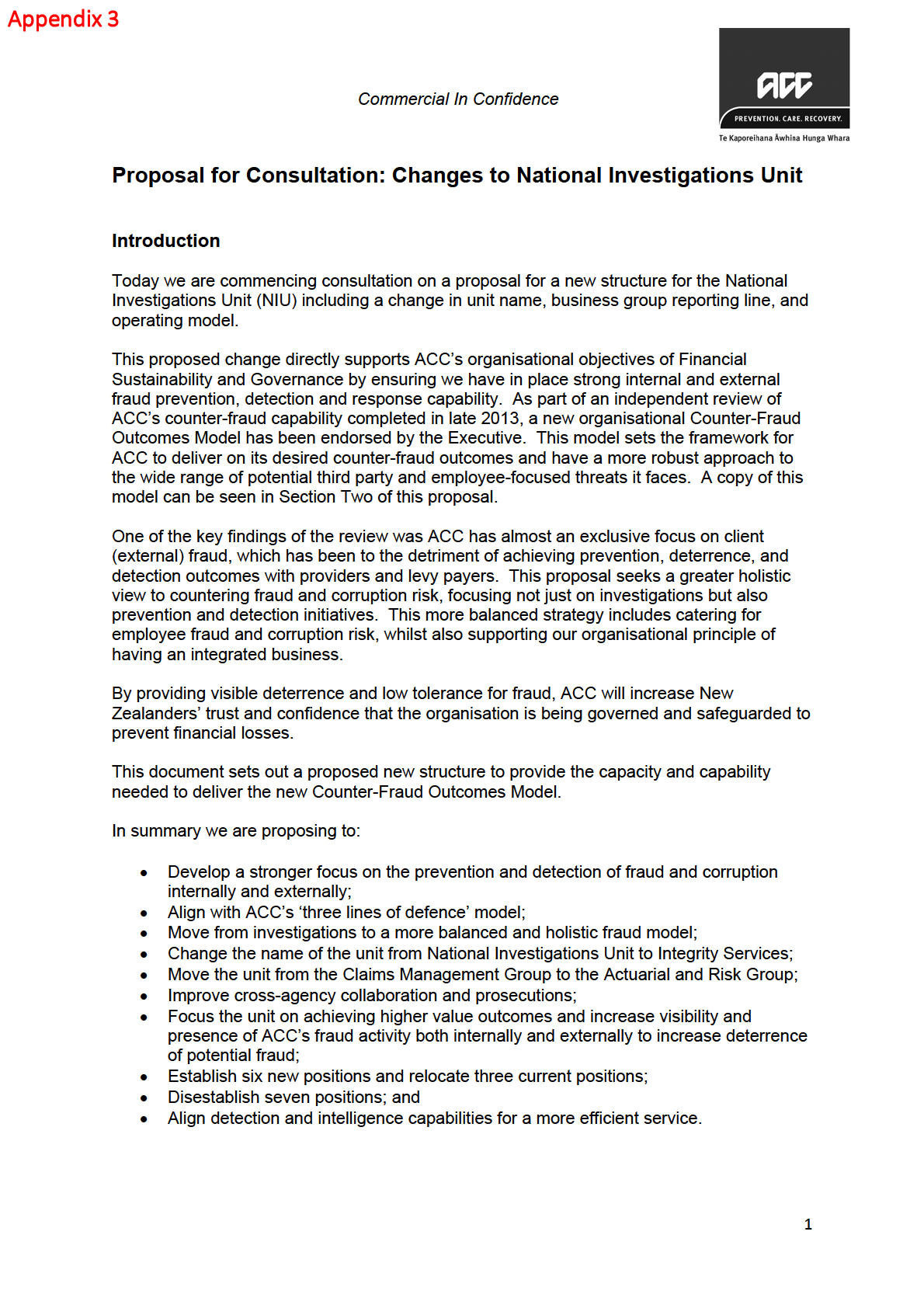

This proposal sets out the background and rationale for change, the impact on roles and
reporting lines, timeframes, and support available for people affected by the proposed
changes.
This is a key initiative for ACC and we welcome your views and feedback – please send this
to [email address].
Consultation on the proposal closes at 5pm on Wednesday 7 May 2014, after which we will
consider all feedback and make final decisions.
Sid Miller
General Manager, Claims Management
10 April 2014
2
Contents
1. Background.................................................................................................................... 4
2.
Why change is necessary.............................................................................................. 4
a.
Challenges with the current structure.................................................................. 5
b.
Implementing the new Counter-Fraud Outcomes Model..................................... 5
c.
Improving fraud and corruption risk management ............................................... 6
d.
Greater internal fraud capability .......................................................................... 7
e.
Greater structural alignment, leadership, and support to the business ............... 7
f.
Alignment with ‘Three Lines of Defence’ model .................................................. 7
g.
Greater cross-agency collaboration .................................................................... 7
3.
Key objectives of proposed change............................................................................... 8
4.
Impact on National Investigations Unit .......................................................................... 8
5.
Proposed structural changes ......................................................................................... 9
a.
Current structure – National Investigations Unit .................................................. 9
b.
Proposed new structure – Integrity Services Unit ............................................. 10
c.
Proposed new positions to be established ........................................................ 11
d.
Proposed positions to be disestablished ........................................................... 11
e.
Proposed changes in reporting line................................................................... 13
f.
Proposed minor change to position................................................................... 13
6.
How to give feedback .................................................................................................. 14
7.
Support for staff ........................................................................................................... 14
8.
Implementation of decisions ........................................................................................ 14
9. Indicative
timelines ...................................................................................................... 14
Appendix A: Deloitte Review – ACC Investigation Capability Review (enclosed) ............... 15
3
1. Background
The NIU is currently based within Claims Management Group (CMG). An independent
review of the NIU was commissioned in 2007, which resulted in changes to the structure and
focus of the unit to achieve greater alignment between the Fraud Unit and the wider
organisation.
Since then, the unit’s focus has been to investigate situations where there are indicators that
clients are acting dishonestly towards ACC for the purposes of financial or personal gain.
A further independent review was commissioned and undertaken by Deloitte between March
and September 2013. The scope was to review the following key areas:
Internal Fraud Capability;
Fraud & Corruption Risk Assessment; and
Review of the ACC National Investigations function.
A copy of the report from this review dated 28 November 2013 is provided as Appendix A.
The 2013 review included:
An assessment of the NIU’s implementation of agreed changes following the 2007
review;
A gap analysis on how ACC currently approaches internal and external fraud and
corruption risk, compared to other organisations considered to reflect best practice in
this area;
An action plan to close these identified gaps;
A proposed organisational model (the Counter-Fraud Outcomes Model) to better
manage fraud and corruption risks; and
A proposed organisational structure to better position ACC to manage fraud and
corruption risks internally and externally, aligned to the Counter-Fraud Outcomes
Model.
The review also identified there was not a planned and structured approach to managing
internal employee fraud. It recommended ACC seek further information about best practice
organisational approaches to the management of internal fraud from a range of public and
private sector organisations.
The benchmark organisations used, who are considered to reflect best practice risk
management in this field, included the Ministry of Social Development, Inland Revenue,
Ministry of Business, Innovation and Employment and New Zealand Police.
2. Why change is necessary One of the key findings of the review was the NIU has almost an exclusive focus on
investigating client (external) fraud, which aligns with the unit’s placement within the CMG.
This focus has not fostered a balanced approach to managing fraud risks by achieving
prevention, deterrence, and detection outcomes with clients, providers and levy payers. To
address this, a more holistic view to countering fraud and corruption risk is proposed. It
would focus not only on investigations but also prevention, deterrence and detection
initiatives for all three groups at all levels across the unit. In addition, the review
recommended the NIU leads ACC’s management of internal fraud risks.
4
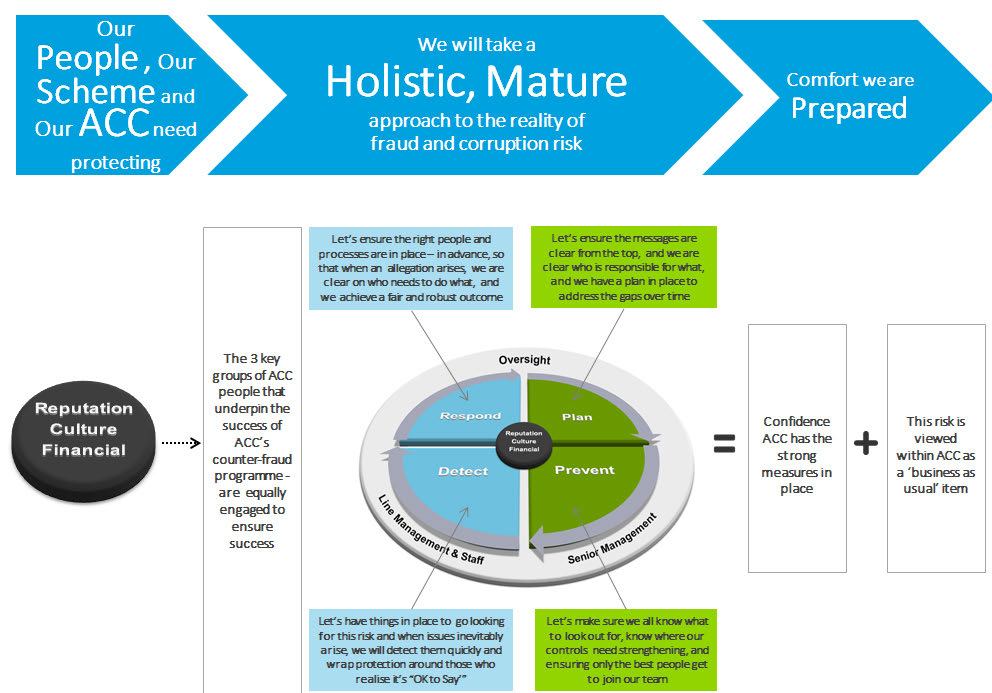
Another key finding was that the Intelligence capability is not currently well aligned to the
Investigators or the business groups they support. This has resulted in inefficiencies arising
through a lack of communication and shared purpose. The regional location of the
Investigation teams was cited as effective in promoting greater customer centricity with the
wider business.
a. Challenges with the current structure
The review identified the following issues with the current NIU organisation structure:
It is not aligned to ACC’s ‘three lines of defence’ risk framework;
The multi-layered structure across some units does not provide a basis for efficient
and timely decision-making;
The centralised model for Intelligence does not meet the needs of its customers i.e.
regionally based investigators;
Clear accountability for decision-making is not embedded within the structure; and
The structure does not support clarity around roles and responsibilities for fraud and
corruption management in the organisation, i.e. what is the responsibility of the NIU
and what is the responsibility of the business groups they support?
b. Implementing the new Counter-Fraud Outcomes Model
As part of the review, a new Counter-Fraud Outcomes Model was designed. This has been
endorsed by the Executive. The new model will work alongside ACC’s existing risk
management function to provide greater leadership and an effective framework for how we
behave towards fraud moving forward.
5
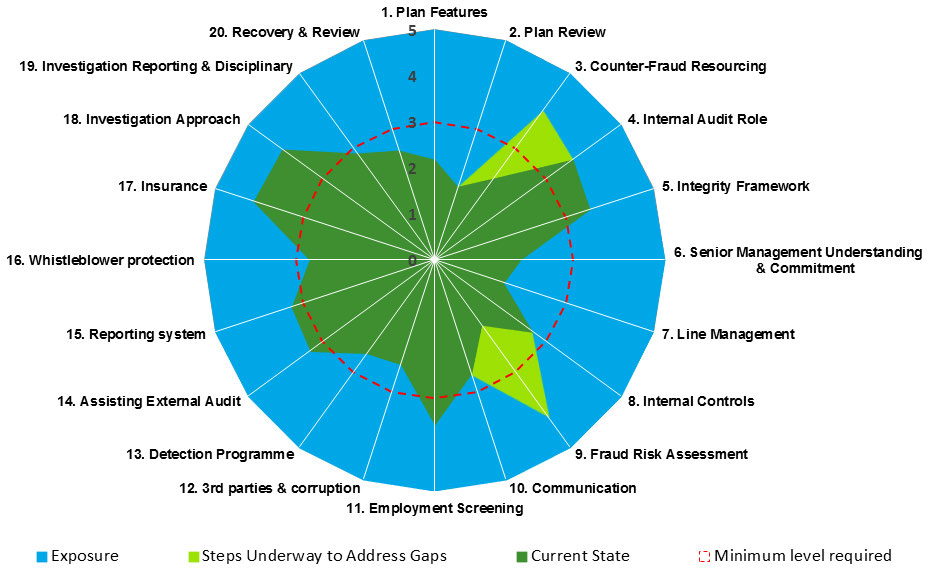 c. Improving fraud and corruption risk management
c. Improving fraud and corruption risk management
The review included a gap analysis of ACC’s management of fraud and corruption risks,
compared to best practice. It assessed ACC’s performance against each of 20 best practice
features of an effective fraud and corruption management system. A score of five
represents best practice, with three the ‘industry minimum acceptable level’ that would be
expected. The results are shown pictorially below.
To address these gaps and achieve at least the ‘industry minimum acceptable level’, the
following changes must be made to the way we manage fraud and corruption risks at ACC:
ACC needs to take a more strategic focus to the management of fraud and corruption
risk, focussing on prevention as well as investigation and detection. This can be
achieved through implementing the Counter-Fraud Outcomes Model;
The NIU needs to be repositioned to be a highly visible part of ACC’s ‘three lines of
defence’;
The focus of the NIU needs to be expanded to include provider fraud, levy payer
fraud, client fraud, and internal fraud;
A clear and balanced strategy for the prevention, investigation and detection of fraud
across all four fraud focus areas needs to be developed; and
A new organisational structure needs to be introduced to drive a more holistic
approach to fraud and corruption management, aligned to Risk and Assurance.
This new holistic approach to fraud will be achieved through the current unit by focusing on a
smaller number of cases, with higher value outcomes.
6
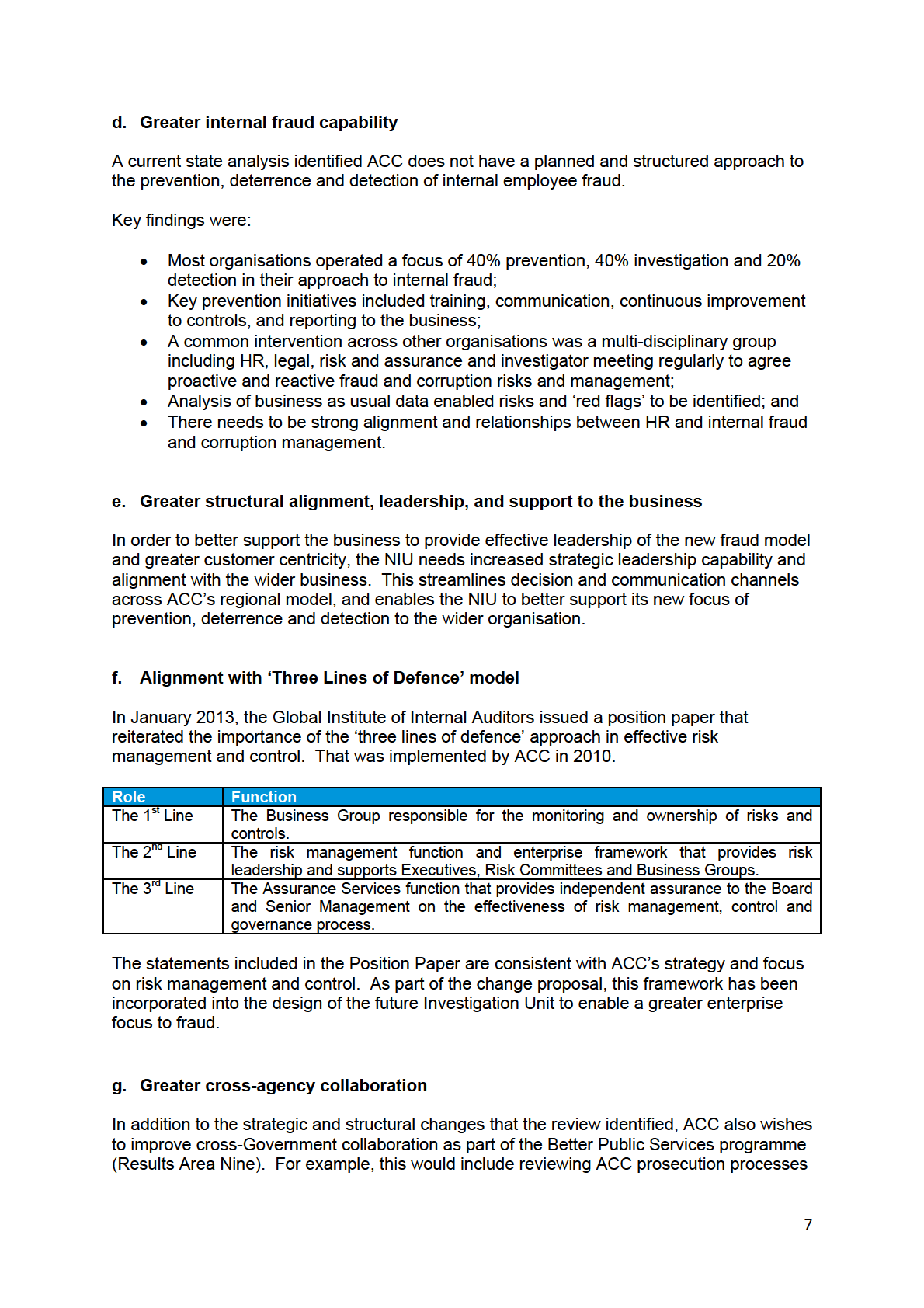
against the model used within other similar prosecuting agencies as specified by the Crown
Law Public Prosecutions Unit.
3. Key objectives of proposed change
The key objectives of the proposed changes are to:
Ensure the scope, objectives and structure of the unit are aligned to ACC’s strategic
direction and three lines of defence risk model across ACC;
Implement strategies which achieve ongoing reduction of internal and external fraud
and corruption risk to ACC;
Position ACC to take an increasing involvement in collaboration with other agencies
in tackling the risk of fraud;
Promote and increase the level of fraud and corruption awareness within ACC;
Create a structure which improves speed and accuracy of decision making and
provides clarity around roles and responsibilities for fraud and corruption
management both internally and externally;
Create a more holistic approach to fraud, which balances prevention, deterrence and
detection across all four fraud focus areas (internal, provider, client and levy fraud);
and
Improve alignment with ACC’s ‘three lines of defence’ as part of the risk management
and control framework.
4. Impact on National Investigations Unit
The review outlines a proposed structure, aligned to the new Counter-Fraud Model. This
structure focuses on repositioning the unit from a functional to an enterprise ACC focus by
broadening its scope to introduce the Internal Investigations arm, and adding the discipline
of maintaining ACC’s ongoing fraud and corruption risk assessment as part of the ‘three
lines of defence’ model.
Key proposed changes from the current state are:
The unit would be re-titled Integrity Services and moved from the Claims
Management Group to the Actuarial and Risk Group;
It would be led by a newly established position of Head of Integrity Services,
reporting to the General Manager – Actuarial and Risk;
Integrity Services will support a ‘whole of the business’ approach to fraud and
corruption. This will require the Head of Integrity Services to work closely with the
Chief Risk Officer, People & Communications, and the business groups that Integrity
Services supports across ACC;
The unit would align its structure with the four regions in the Claims Management
Network (Christchurch, Wellington, Hamilton and Auckland). This includes
establishing a fourth Area Investigation Manager to provide greater strategic focus for
both the new region and the already established South Auckland Investigations
Team; and
Group Investigators and Intelligence staff, together with their Area Investigation
Manager, will provide more tailored support across the four regions.
8
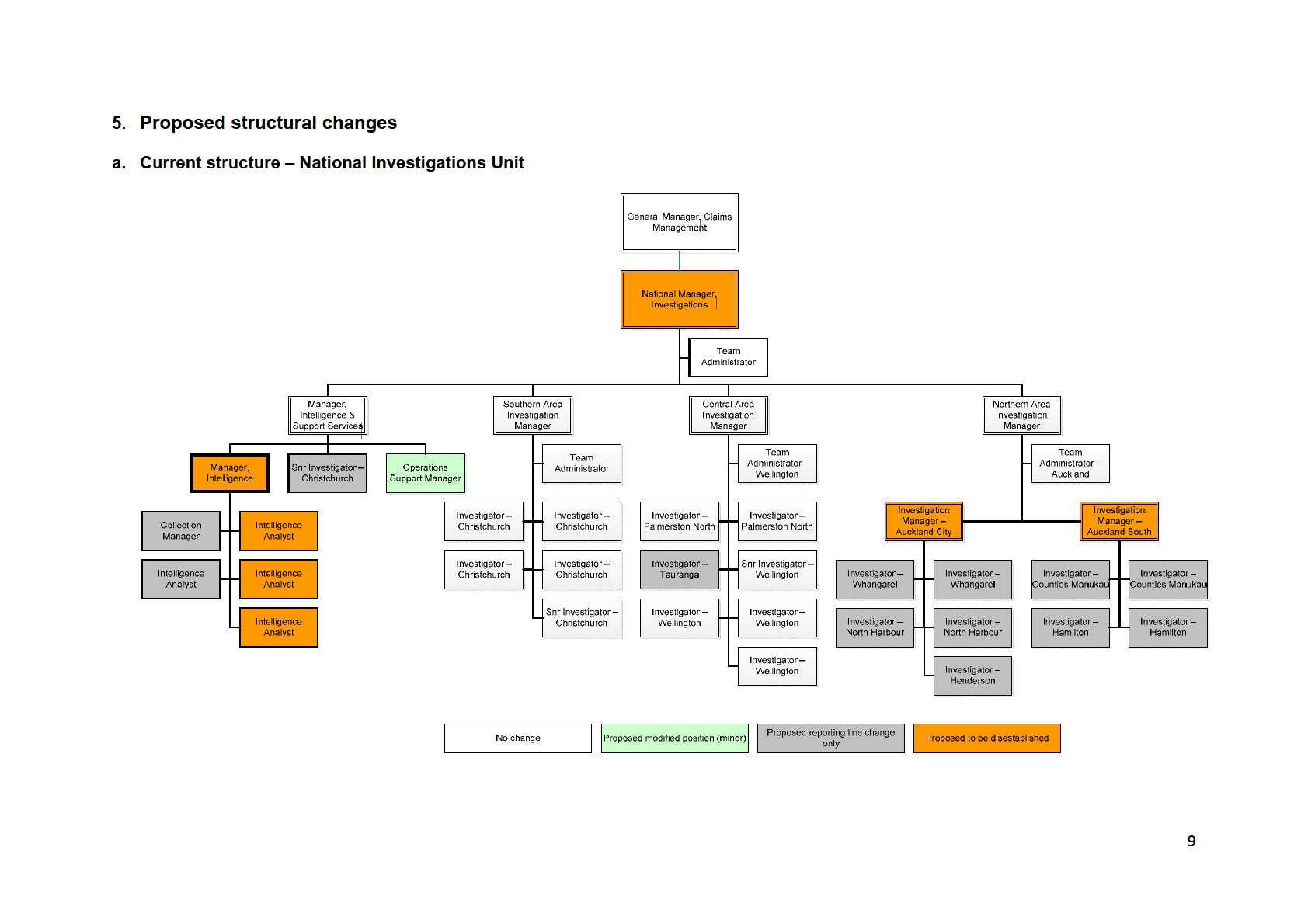
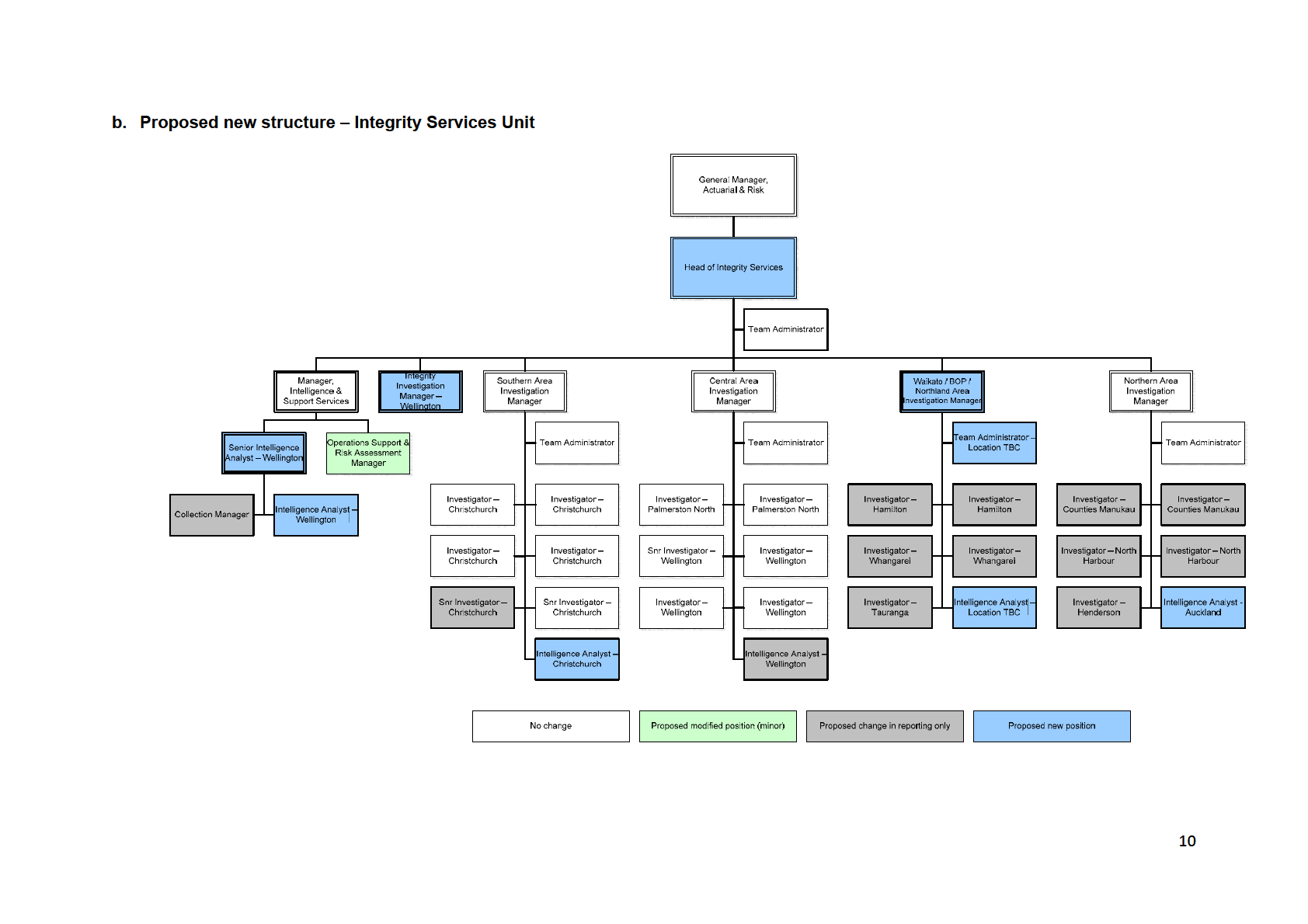
c. Proposed new positions to be established
The following new positions are proposed to be established:
Position Rationale
Head of Integrity
This role will be responsible for leading the development and
Services – 1 FTE
implementation of a new counter-fraud model for ACC, with significant
focus on managing an integrated approach to the prevention and
deterrence as well as detection and response across all types of fraud.
This role will require significant engagement with the Executive,
management teams, HR and Risk, aligning ACC strategic direction to
the counter-fraud strategy for ACC.
Integrity Investigation
This role will be responsible for managing an integrated approach to
Manager – 1 FTE
deterrence, prevention and detection of and response to employee-
related fraud, with a greater focus on communication with its customer
stakeholder groups.
Area Investigation
It is proposed that a new position of Area Investigation Manager be
Manager – 1 FTE
established in the Waikato / BOP / Northland region. The establishment
of a fourth Area Investigation Manager will provide greater strategic
focus to the new region and provide greater leadership coverage
across the team.
Senior Intelligence
This role will be responsible for providing best practice subject matter
Analyst – 1 FTE
expertise across the intelligence team. The key function will be to
provide a Business Analyst function by developing and implementing
robust business and reporting processes across the team.
Intelligence Analyst –
The four existing Intelligence Analyst roles will remain the same in
3 FTE
scope; however three non-Wellington based roles will be established in
the regions (Southern, Northern, and Waikato / BOP / Northland) to
align with the Branch Network.
Intelligence Analysts –
An additional (fifth) Intelligence Analyst across the Unit will be
1 FTE
established and located in Wellington. This role will however have a
slightly different focus than the regional Intelligence Analysts towards a
Centre of Excellence approach. It will also provide overflow support to
the regional Intelligence Analysts.
Team Administrator –
This role will be responsible for supporting the Waikato / BOP /
1 FTE
Northland Area Investigations Team.
d. Proposed positions to be disestablished
The following positions are proposed to be disestablished:
Position Rationale
National Manager,
The scope and accountabilities for this position are not sufficiently
Investigations
aligned to the new Counter-Fraud Model, which takes a holistic
approach to the management of fraud and corruption risk. A greater
focus is required at a strategic level to provide direction to the
organisation regarding; prevention and detection, employee fraud, risk
management and be customer facing to ACC Executive team and
11
staff. This significantly increases the breadth of responsibility of this
role as it is not only responsible for the delivery of the fraud function,
but accountable to develop and implement strategy which aligns the
unit’s strategies to ACC’s strategic direction and enterprise Risk
Management.
These amendments constitute a significant change to the current
position description.
Intelligence Analysts
It is proposed to disperse the Intelligence Analyst positions to the
(3)
regions to ensure the provision of intelligence analysis is aligned to
regional needs, reporting to the Area Manager. This will enable the
Intelligence Analysts and Investigators to work more collaboratively
and understand one another’s needs in one location/area.
One of the four Intelligence Analyst roles will not be disestablished as
the Central Area role is still based in Wellington, so will be a reporting
line change only.
Roles will be offered to existing staff in the first instance and where
there is more than one person wanting to work in the same region,
interviews will determine the final decision.
The change in location for three of the Intelligence Analyst roles
constitutes significant change.
Manager, Intelligence
This role’s management responsibility for the Intelligence function
would be dispersed with the Intelligence Analyst function largely
decentralised to the regions. Two centralised Intelligence Analysts will
now provide strategic intelligence analysis, a centre of excellence
approach, and overflow support to the regional Intelligence Analysts.
These amendments constitute a significant change to the current
position description.
Investigation Manager
It is important in the new structure to have consistency across the
(x2)
management team and currently there is fifth tier level of management
only in the Auckland region. There is a need for additional head count
at the Area Management level to provide greater strategic support
across the Branch Network. Investigators in the northern region will
now report directly to the two Area Investigation Managers. This will
enable improved speed, accuracy and communication of decision
making.
The change in reporting line for all Investigators in the northern region
to Area Investigation Manager constitutes significant change to the
current position description.
12
e. Proposed changes in reporting line
The following changes are proposed to reporting lines:
Position Currently
Proposed
Rationale
reports to
reporting line
Collection Manager
Intelligence
Manager,
Aligns resources to integrated
Manager
Intelligence &
integrity approach
Support
Services
Senior Investigator,
Manager,
Southern Area
Aligns resources to regional
Christchurch
Intelligence and
Investigation
area
Support
Manager
Services
Intelligence Analyst
Intelligence
Central Area
Aligns resources to the regions
Manager
Investigation
– Central Area (based in
Manager
Wellington)
Investigators (Northern
Investigation
Northern Area
With Investigation Manager
Area only)
Manager (both
Investigation
roles proposed to be
Auckland City
Manager; and
disestablished, the Investigators
and Auckland
Waikato / BOP /
in the current Northern Area will
South)
Northland Area
now role to their respective
Investigation
Area Investigation Manager
Manager
directly.
f. Proposed minor change to position
The following minor changes are proposed to existing positions to better align with the new
strategic direction of the unit. These are only minor changes and do not constitute
significant change:
Position Proposed
changes
Rationale
Operations Support
The position description would
A greater focus on ACC-wide risk
Manager
include accountabilities for risk
assessment and risk profiling is
assessment. The position would needed for effective deterrence,
be re-titled Operations Support
prevention and detections of fraud.
and Risk Assessment Manager.
Area Investigation
Updated position descriptions
This will ensure the new strategic
Managers
would reference the leadership
direction is implemented
elements of the new strategic
consistently across unit, and
Manager, Intelligence
direction e.g. ‘three lines of
integrated across the wider
& Support Services
defence’; holistic approach;
business.
enterprise wide; and the four
fraud focus areas.
Investigators
Updated position descriptions
This will ensure the new strategic
would reference elements of the direction is implemented
new strategic direction relevant
consistently across unit, and
to investigators e.g. holistic
integrated across the wider
approach and four fraud focus
business.
areas.
13
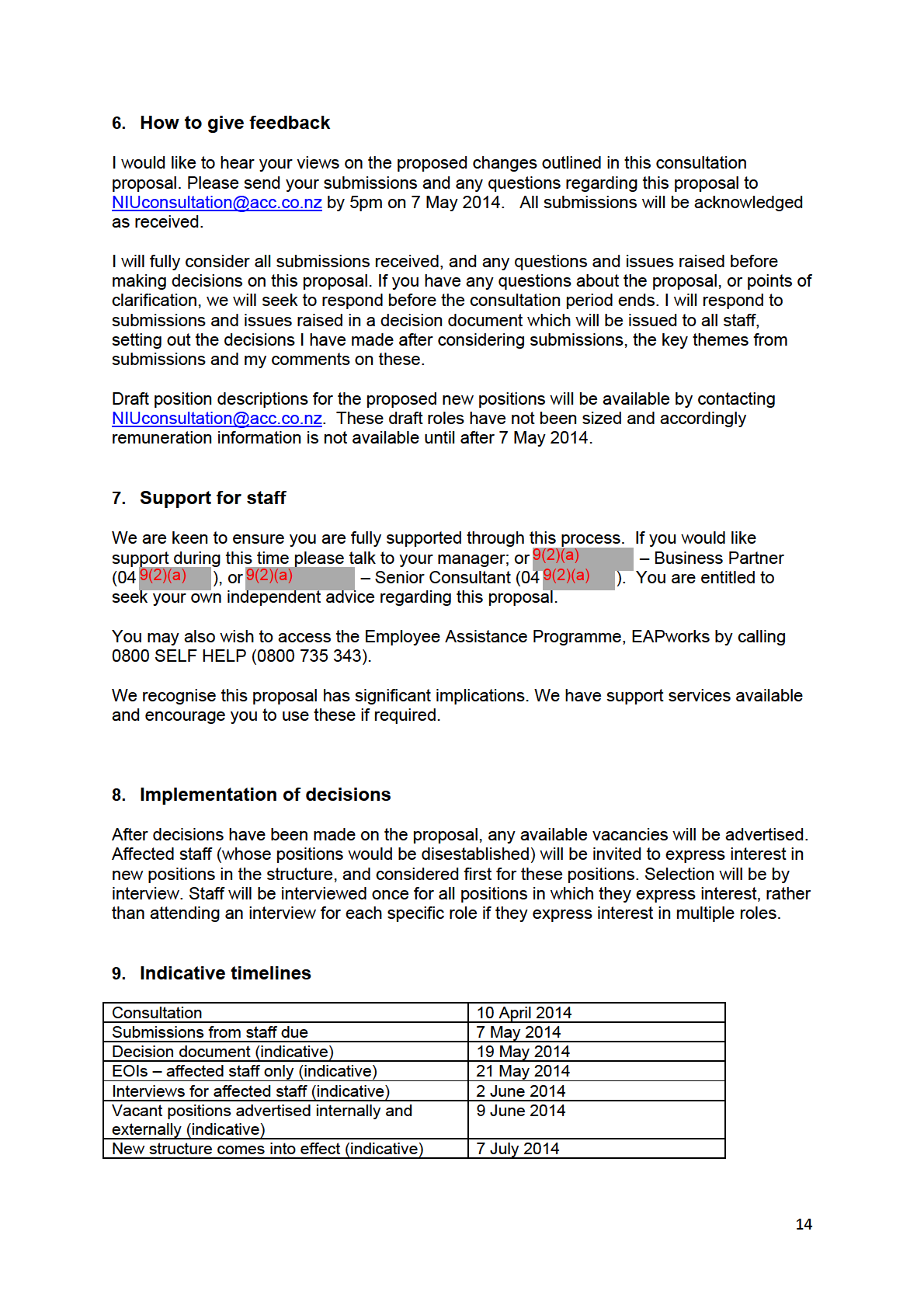
Appendix A: Deloitte Review – ACC Investigation Capability Review (enclosed)
15







